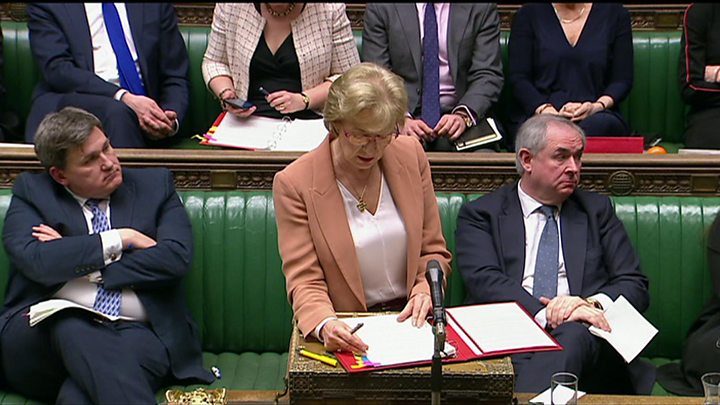The British Parliament still can’t agree on what kind of Brexit it wants.
Members of Parliament (MPs) held “indicative votes” on Wednesday, casting ballots for eight different options on how the United Kingdom should break up with the European Union. The goal of the process was to reveal what kind of Brexit plan might win a majority in the House of Commons, after MPs twice rejected Prime Minister Theresa May’s Brexit deal.
There’s just one problem — no option won a clear majority.
A plan for a second referendum, in which any Brexit deal approved by Parliament would go back to the public for a vote, received the most “aye” votes. A customs union arrangement, where the UK would follow the same customs rules as the EU, came in second.
Earlier that day, the prime minister had announced that she would resign if Parliament backed her Brexit plan, which has twice been defeated in Parliament by very large margins. May is still planning to bring her deal for a third vote, possibly Friday, though nothing is decided yet.
The failure of the indicative votes to break the logjam in Parliament could boost her deal somewhat, as May can make the case that Parliament tried and failed to come up with an alternative. But even with May’s promise to sacrifice her premiership, her deal still might not win enough support.
MPs are expected Monday to debate and vote on the options that got the most votes, to see if it’s possible to win a majority for something. There will probably be a few more twists along the way, but here’s a breakdown of the action on Wednesday and what might happen next.
MPs were given a ballot on Wednesday, which contained eight different Brexit options. They could mark “aye” or “no” next to each, and from there, the ballots were collected and tallied. They looked like this:
Here’s a summary of the eight options and the results.
This means crashing out of the EU without any agreement or transition period in place, and is the default option on April 12 if the UK can’t approve a deal. Parliament has already rejected leaving the EU without a deal, so, no surprise, this was defeated 160-400.
Also known as “Norway Plus.” Not to get super in the weeds, but this is a very soft Brexit proposal, meaning the UK and the EU would have very close economic ties. The model for this is Norway, which is not an EU member but has access to the EU single market, which broadly means free movement of goods, capital, services, and people. The “plus” here is because this would also mean joining a customs union. This went down, 188-283.
The same as the plan above — but without the plus, which means no customs arrangement. This lost 65-377.
This would allow for membership in the customs union post-Brexit, which means the UK would follow all the EU customs rules. This plan was actually the most popular — it got 264 yes votes, and only 272 no votes — so it only lost by eight votes.
This is Jeremy Corbyn’s proposal, which focuses on a future relationship that would involve customs union membership, but with the ability for the UK to make its own trade deals. It would also allow for alignment with the single-market rules and close cooperation on issues like security and with certain EU institutions. It’s not clear the EU would go for this plan because it might involve the UK cherry-picking which EU rules it would follow, but it doesn’t matter, for now, because it lost 237 to 307.
- Revoke Article 50, sort of
This basically called for the prime minister to stop Brexit if the UK doesn’t have a deal two days before the deadline and if Parliament agrees it does not want to leave the EU without a deal. (Article 50 is the mechanism in the EU’s Lisbon Treaty that the UK is using to leave the bloc.) This one lost 184 to 293.
This says that any Brexit deal approved by Parliament has to go back to the public for a vote. This got the most “aye” votes, with 268, but 295 people voted against it, so it was defeated by a greater margin than the customs union.
This is similar to a plan that the EU has already rejected, which would basically involve the UK leaving the EU without a deal. There would still be a transition period whereby the two sides would negotiate some free trade agreements. It was defeated 139 to 422.
Okay, so what does this all mean?
Oliver Letwin, the Conservative MP who put forward the indicative votes motion, insisted that lawmakers should debate again Monday, knocking out the biggest losers (no-deal, etc.) and debating and casting ballots again on Wednesday’s top vote-getters, likely the top four or so, but that’s still unclear. Those still might not secure a majority, but some of these plans such as the second referendum and customs union lost got more votes than May’s deal has — so it might be possible to convert a few MPs to support one of these alternative plans.
Oh, and there’s still May’s deal.
Her announcement that she would resign if Parliament backed her deal on a third vote has convinced a slew of hardliners to support her, but she still doesn’t have the votes to pass it yet. May’s key allies in Northern Island — the Democratic Unionist Party (DUP) — have said they will still vote against the deal, meaning it’s unlikely that it will pass on a third go-round.
Speaker of the House of Commons John Bercow also repeated Wednesday he would not allow a third Brexit deal vote without a substantially changed deal. May’s government is reportedly trying to get around this by bringing forward one part of the Brexit deal — the 585-withdrawal agreement — for a vote on Friday, and leaving off the second part, which is the short political declaration that says the EU and UK will negotiate a future economic partnership. That political declaration would be voted on separately at another time.
The point of this is to lock in a Brexit deadline of May 22. The EU said it would grant the UK an extension until that date if Parliament passed a withdrawal agreement by this week. This would make it less likely that the UK would ask for a longer, indefinite Brexit delay, which would require it to participate in European parliamentary elections, on May 23.
This gambit by May’s government might also be doomed, as some MPs will not want to take a vote without that political declaration attached. Plus, the holdouts on her deal, specifically some Brexiteers and the DUP, still object to the withdrawal agreement.
So, after a day of high drama, the UK is still deadlocked over Brexit.
Parliament did, at least, officially change the Brexit date from March 29 to April 12 on Wednesday with overwhelming support. The UK has an two extra weeks to come up with a plan — though no one knows what the heck that might be.
Let's block ads! (Why?)
https://www.vox.com/2019/3/28/18284470/brexit-parliament-indicative-votes-theresa-may-deal
2019-03-28 16:10:00Z
52780249686109







